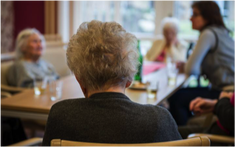 Helping children get up and go From Nine To Noon, 11:27 am on 17 October 2019 When children lack motivation and drive, their parents can be lost as to how to help them regain direction. Education consultant and parenting coach Joseph Driessen told Kathryn Ryan that in these situations some children can be defeated by their lack of self-management, amid other possible problems like learning difficulties. “They're just depressed because they can't make themselves follow through. They can't make themselves tidy up their work. They can't make themselves remember what to do. They go to school disorganised. “Or some small children are just caught into a sort of an ADHD pattern of completely kind of being hyperactive and not calming down and not doing anything and eventually, both the parent and the child give up because they lack the skills or the system isn't working.” Listen to the full interview with Joseph Driessen
A lack of belief in one’s self or lack of confidence can arise after repeated failures, Driessen says. Eventually, the child can fall into a pit of realisation that they will not be able to accomplish anything and gives up, he says. Ultimately, their energy and feelings become negative. But there are also children with attention deficit disorder, Driessen says, whose neurological system is far more focused on the immediate outcomes rather than the prioritising the most important goals and tasks. “And so you get sidetracked, you don't read your list, you forget your diary, you don't pack your bags because something else takes the place and you just get caught in the moment and you think, 'well, that's fine that's what my brain told me to do, but now I forgotten this'. “Repeated failures of that, that can cause a child to become deeply demotivated.” As a result of a lack of coherent planning and execution of important tasks, he says teenagers can feel down about sustained failure and not progressing in areas at school. Strategies to help However, there are ways for parents to help children who fall into that predicament. Driessen says the first thing to note is sometimes in these situations even the parent feels defeated. “But what the children really most respond to, what I found and what the research finds, is that actually the adult takes it seriously and sits down with them and initiates a series of conversations initially, then actions. “So a conversation might be 'well this is not working, you're doing year 11 NCEA, you haven't started anything, it's a shambles, and we've tried, let's sit down and work hard, and then let's have some expectations of change, and let's do that together'.” The parent's determination, guidance and analysis of what’s really happening gives the child hope, he says. “Goal setting is very important, but each goal should have a reasonable stage for what they can do, and they should tick them off and feel that we're getting there. “Goals really need to be based on their dreams on what they really want to achieve … you can't ram goals down people's throats.” And getting that conversation going is a good start, but it must be followed up with insistence for accountability to wake the child up a little, he says. Driessen suggests parents also enforce better routines – going to bed at a certain hour, unpacking at a certain time, and so forth. “The second thing is you got to realise that some children can't - they're just so scattered, it's not their fault. They can't concentrate on what's most important now, and so very short lists with colours and big letters on the fridge, changing them in the morning, in the afternoon, evening, because some children just can't cope with 10 things, they just need three. “Or little reminder cards, or kneeling down at the child's level and looking them in the eye and say, remember, what is the most important thing you're supposed to be doing now?” Another approach Driessen recommends is the Montessori system, whereby children organise themselves and become more self-aware by writing down when they did certain tasks and for how long. He says these tactics will create a more simple and explicit communication system - lists, cards, labels – so that the child can eventually learn to manage themselves. Driessen also notes it’s critical that this process is ongoing – that they revisit where they’ve reached, with frequent catch-ups or chats – otherwise there’s a risk of them backsliding. Some parents misunderstand how much guidance, structure, accountability and encouragement children need, he says. Positive reinforcement in between is key On the other hand, some parents can also become over-stressed or disappointed to the point where they only focus on when the child fails. It pays to be positive with research showing that we are designed to follow positive reinforcement, Driessen says. “You might say to a child who's had quite a bad day, 'well, some parts of the day went really, really well, and I'm really happy about that’. So you keep on focusing on what goes well, and how they could improve and you keep on saying, 'well, you're just growing up and you're just getting a little bit better'. “Because once a child has that self image of ‘I'm a failure’, they will be surprised and will not accept your compliments … But once a child thinks, 'well maybe I'm getting better at whatever it is', then you can say, ‘well, let's try and be better next time’.” To encourage and get that child feeling they’re accomplishing, parents can try to focus on picking the small battles first, he says. “Some children actually are quite stubborn, once they enter this dysfunctional behaviour, they are not going to do it. In the worst cases, the parents get really angry and then has a massive row and then not doing anything and the whole thing starts again. But it's better to actually start small.” For example if a parent is concerned their child is not doing homework and exams are coming up, they can start by telling them that without any exceptions at such a time they will unpack their bag. They may be stubborn and ‘forget, he says, but the adult must remain firm on their resolution and try to win in this “battle of wills”. “They reluctantly sit down at the table and do it, unpack that bag and then [the adult] says, ‘well, that's really good … okay, now the next thing is that we're going to do...' so you carry on. “You win one small battle, you make it a habit, and then you make the next a small habit, and you win that. Sometimes the initial winning, that the parent actually prevails and the child gives in, actually is what the child wanted. They wanted an adult to take charge, set limits, obtain them.” Reference: Radio NZ Nine to Noon  Reducing your risk of dementia as cases soar From Nine To Noon, 9:35 am on 27 July 2021 Currently, 70,000 New Zealanders have dementia. That's set to rise to 170,000 by 2050. Auckland psychiatrist Dr Etuini Ma'u is the co-author of a University of Auckland study that shows the potential for reducing rates of dementia by targeting common risk factors in middle-aged New Zealanders. 'It's a really simple message to get out there - anything that is good for your heart is good for your mind' : Add to playlist Download It's a misconception that dementia is a disease of the elderly, Dr Ma'u says. While the symptoms manifest in older age, in the 20 years before there are incremental changes occurring in the brain of a person who will develop dementia. There are twelve modifiable risk factors for dementia, as highlighted in a 2020 Lancet Commission report: less education (i.e. not completing high school) hypertension, hearing impairment, smoking, obesity, depression, physical inactivity, diabetes, low social contact, excessive alcohol consumption, traumatic brain injury, and air pollution. The University of Auckland study also looked at the prevalence of these risk factors across different ethnicities in New Zealand - and found they differed between ethnic groups, Dr Ma'u says. To be effective, any government dementia prevention strategy would have to be tailored to target New Zealand's ethnic groups specifically. "For example, in Pacific Island groups, because the cardiovascular risk factors are so much higher potentially, that's where the targets need to be. But in Europeans, depression and social isolation are coming up with the strongest link, on top of hearing loss." The study's findings are a great starting point for discussion about how New Zealand can target dementia risk factors and reduce dementia prevalence. "It's a really simple message to get out there - anything that is good for your heart is good for your mind." Dr Etuini Ma'u is a consultant psychiatrist at Waikato Hospital and a senior lecturer in Psychological Medicine at the University of Auckland. Reference: Radio NZ  Is running or walking better for you? From Sunday Morning, 7:45 am on 29 November 2020 Share on Twitter Share on Linked In We all know the benefits of exercise are enormous — but do we need to run to get the best physical returns, or can we get enough just from walking in the time we have to exercise? In a recent piece in New Scientist, sports engineer Steve Haake pitted running against walking and dispelled a few myths along the way. He told Jim Mora that the mechanisms for the two exercises are subtly different and that as a species, humans are built for endurance. “We’re designed for going long distances, hunting for our food, when you find that food what you do is stuff it down your face, you’ll eat as much of it as you can, you put on weight… we’re very good at putting on weight, we’re designed to do that, so that then you can go walking long distances hunting out your next bit of prey, you lose weight while it happens and then you find your next bit of prey and stuff your face with that.” Listen to the interview on Sunday Morning with Jim Mora He says anecdotally, running and walking produce the same amount of injuries as each other, though stories of runners’ injuries are more talked about. But he says there is also an abundance of evidence that running helps lower the risk of health defects such as cardio-vascular problems, diabetes and stroke, compared with walking. However, there are caveats. “If you walk half as fast and twice as long (as a run), you cover the same distance, you’ve done the same amount of energy as running it in half the time… the risk (of those health problems) was the same. “The key is getting your heart rate up, a brisk walk is as good as a slow run, it just takes longer to get there.” Professor Steve Haake So, while you may think walking is better for you than running or vice versa, Haake says it is important to remember that both are a safer option than doing nothing. “Generally in a country like New Zealand and the UK we’ll have 25 percent of the country being completely inactive, doing less than 30 minutes [of exercise], so that’s our sedentary population which we worry about a lot… we have these problems over here in the UK where people will automatically just get in their cars to drive to the shops, to go and buy the paper, to go to work… and then they’ll sit there for 15 minutes in the car and it just does not do them in any good when they could’ve probably walked in 10, 15, 20 minutes. “So, those 10, 15 or 20 minutes, if you are sedentary, are the most important 10 minutes of your life, they are likely to save your life… you want to do 150 minutes brisk walking] a week at least (to reduce your chances of disease by 10 percent).” Reference: Radio NZ |
AuthorShonagh O'Hagan Archives
July 2024
|

 RSS Feed
RSS Feed